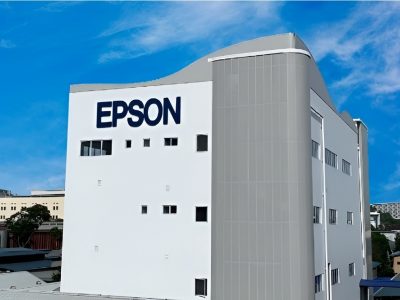Phi Automation optimises production capacity with Epson’s SCARA Robots
Epson’s SCARA automation technology has enabled Company expansion and diversification
With the push to modernise and transform Thailand’s manufacturing sector, the demand for robotics and automation technology has grown. This is consistent with a Forrester Consulting study completed in 2020 which confirms that two-thirds of the 270 manufacturing companies surveyed seek to increase their robotic process automation (RPA) capabilities.
Over the last ten years, market demand has led to a marked increase in industrial manufacturing across Thailand. In recent years, companies have begun to purchase more robots to level up their competitiveness and capability.
Responding to the huge opportunity in automating production across Thai industries, automation engineer Chang Pongsuthee founded Phi Automation in 2010. Since then, with him as the Company’s Managing Director, Phi Automation has provided systems integration services, the design of automation solutions, automated machines, interface software and programs, and the maintenance of mechanical parts for different companies in Thailand.

Phi Automation Managing Director Chang Pongsuthee specialised as an automation engineer.
Taking advantage of a need driven by resource management
When Phi Automation was established, labor costs were on the rise in Thailand.
“Most of the production facilities in Thailand are labor-based so I saw an opportunity to put up an automation business to help provide automation solutions that companies needed to become more productive,” he says.
Mr. Pongsuthee worked to integrate robotic automation systems into the manufacturing process to help address the rising cost of manpower while enabling them to meet increased demand from the market. The company initially handled projects for electronics and medical industries to develop small machines.
“When we started out, we were headstrong about integrating robotics into our system, but the costs then were prohibitive – about 4 or 5 times more than what robots cost today. I knew about Epson’s SCARA robots from my time as an engineer with a previous company. I knew that this technology would be helpful in the overall manufacturing process,” be explained.
Studying how they could further improve their operations, Phi Automation used cost analysis to evaluate what type of robotic technology would be right for them. While Cartesian robots were more affordable, SCARA robots offered more potential business benefits for the company beyond cost.
SCARA Robots bring greater productivity and efficiency to operations
Using his experience as an automation engineer, Mr. Pongsuthee initially maximised the use of Cartesian robots along with single, two and three-axis robots in the Phi Automation manufacturing line. Later, realizing that they needed to further optimise their processes, the Company found SCARA robots to be the more practical and functional option. Working with SCARA robots gave Phi Automation the ability to beef up their production capability and cater to more clients.

Epson SCARA Robots at Phi Automation are fully integrated in the production line.
“What I like about SCARA robots is that they are much more compact. The space saving feature allows more flexibility in the production line to contribute to the overall production process,” he explains.
Before SCARA robots, it would normally take the company three to four months to complete a project, covering the whole process of mechanical, electrical, and control engineering design. The company would usually dedicate a full month for fabrication, then another month to go through the assembly and test the machines before turning over to customers.
The installation of Epson’s SCARA robots significantly shortened their design process to 45 days. Set up and installation were quicker and simpler as engineers needed only to plug the robots into an electrical socket, screw them onto the production line, and the SCARA robots are ready to use. Maintenance was also hassle-free.
Mr. Pongusthee explained, “Epson’s SCARA robots were simple to integrate into our systems back then. Cartesian robots took days to integrate, but it only took us a matter of hours with SCARA. We just needed to find the correct and ideal position in the assembly line and programming the robot was simple. It was also easy to implement.”
The transition from using Cartesian robots to SCARA robots presented a challenge to the young team of engineers at Phi Automation. However, with the help of training for new users of SCARA robots provided by Epson, the engineers soon familiarised themselves with the technology.
Over the years, Phi Automation has been able to notice marked improvement in efficiency, precision, and cost of operations since the installation of the SCARA robots.
Improvements at Phi Automation
Phi Automation has since expanded its business outside Thailand to service clients in Vietnam, South Africa and Japan. Today, they are gearing up to expand their services to other industries such as the automotive and food & beverage sectors.
Since the installation of Epson’s SCARA robots, Phi Automation has been able to handle bigger and more complex projects. This has led them to work with clients who are more particular about the technology that they wanted to utilise.
“Our clients usually come to us with specific requirements regarding the technology they want us to use. By demonstrating the advantages of implementing SCARA robots, our customers are fully satisfied. On our end, we have seen how SCARA robots can help improve timelines,” said Mr. Pongsuthee.
Phi Automation projects that the manufacturing sector in Thailand will continue to grow, and a need to keep improving what they offer to cater to the varying needs of the different industries. For example, they must work toward increasing efficiency and improving on safety which can be addressed by the technology in Epson’s SCARA Robots.
In the next five years, Phi Automation also sees opportunities in the electronics and automotive sector. Mr. Pongsuthee anticipates that the growing conversion of combustion engines to electric engines in the automotive sector and the demand to create hardware for big data will bring in more jobs that will require heavy automation.
“At the end of the day, our customer’s success is also our success. We are always looking for the technology that will give them the best solution,” he says.
Posts You May Like
Get Social With Us


